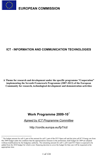 This work programme (WP) defines the priorities for the calls for proposals to be launched in the period 2008-09. Projects resulting from these calls will start having an impact on markets in the 2015-20 timeframe. By then, the global ICT/knowledge infrastructure - networks, devices, services - as well as the market structures, value chains and business models are likely to have changed considerably from today's situation. The research challenges in this WP are expressed with this in mind.
This work programme (WP) defines the priorities for the calls for proposals to be launched in the period 2008-09. Projects resulting from these calls will start having an impact on markets in the 2015-20 timeframe. By then, the global ICT/knowledge infrastructure - networks, devices, services - as well as the market structures, value chains and business models are likely to have changed considerably from today's situation. The research challenges in this WP are expressed with this in mind. New breakthroughs in ICT will continue over the next decades to bring ever-more wide ranging applications that will continue to drive growth and innovation and ensure sustainability in our economies and societies. In the context of defining priorities for this WP, three future technology and socio- economic transformations stand out: the 'Future Internet', the 'alternative paths to ICT components and systems' and 'ICT for sustainable development':
- New network and service infrastructures will emerge replacing the current Internet and Web. The research effort in this field has to be refocused to ensure European leadership in developing the 'Future Internet'.
- ICT based on nano-scale integration, new materials, photonics and organic electronics will provide new types of devices and intelligent systems. Research has to take into account also the various new paths towards the next generation components and systems, notably in the 'beyond CMOS', photonics, micro-systems, embedded systems, organic and large-area electronics domains.
- The future developments of ICT will be driven to a large extent by emerging societal challenges. In particular, the next generations of ICT will have to support the targets for lower carbon emissions not only with ultra low power consumption ICT devices and equipment but also through ICT solutions for better energy efficiency, lighting, virtual mobility and more efficient environmental simulation and monitoring. Support to this area is strengthened substantially and will address the various dimensions of ICT's contribution to sustainability.
In addition to the above transformations, the main mid-to-long term drivers for ICT research priorities identified for the first phase of FP7 remain valid today. These drivers include the high expectations of 'more for less', i.e. more functionality and performance at lower cost as well as the need for better scalability, adaptability and learning capabilities of ICT systems. They also include stronger requirements for reliability and security of ICTs and the need to handle higher volumes and more complex digital content and services and to facilitate user control. More innovation is also emerging from the use of ICT in ever more challenging applications in particular for health and social care, for transport, for lifestyle, culture and learning, energy and the environment.
Download Work Programme for FP7 ICT Research 2009-10 (.pdf, 604 KB).
Download from the eHealthNews.EU Portal's mirror: Work Programme for FP7 ICT Research 2009-10 (.pdf, 604 KB).
Related Publication:
For further information, please visit: ICTs in FP7
Copyright ©European Communities, 2008
Neither the Office for Official Publications of the European Communities, nor any person acting on its behalf, is responsible for the use, which might be made of the attached information. The attached information is drawn from the Community R&D Information Service (CORDIS). The CORDIS services are carried on the CORDIS Host in Luxembourg - http://cordis.europa.eu. Access to CORDIS is currently available free-of-charge.